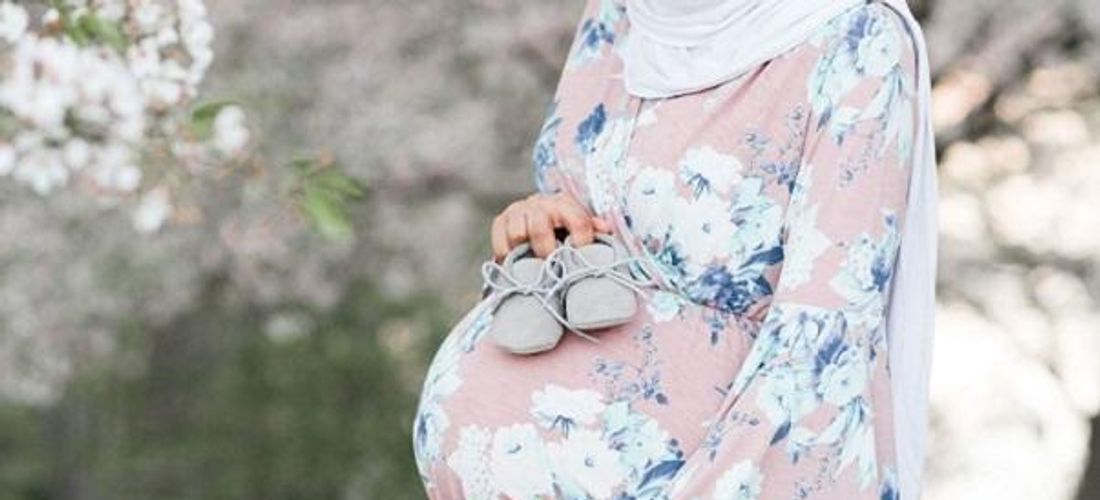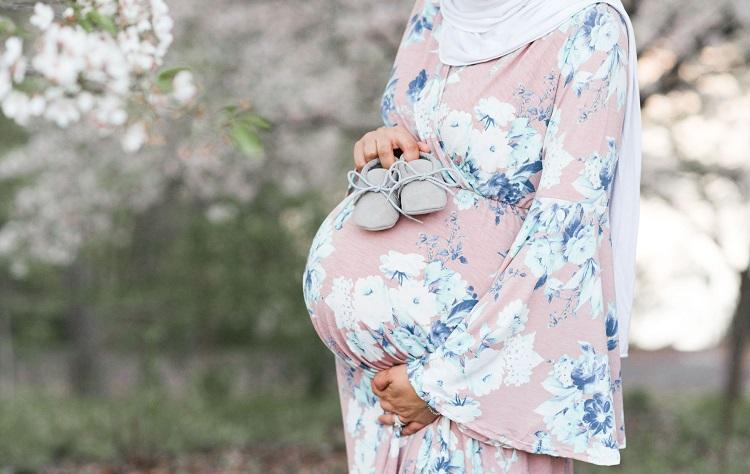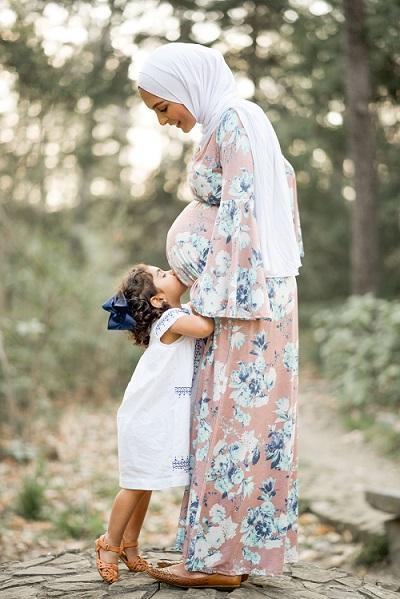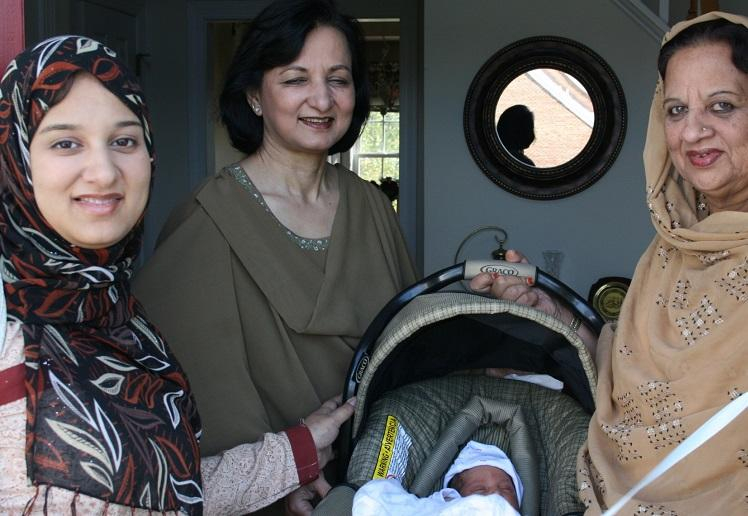Pregnant in Ramadan - Swapping Stories of Pregnancy, Birth, Postpartum & Nursing
Faith
|
May 9, 2019
|
9 MIN READ

With pregnancies usually lasting around nine months, chances are that if you’re Muslim and have had a baby, you’ve either been pregnant, gave birth or have nursed during Ramadan. And, while Islam and the Quran gives pregnant and nursing women an exemption from fasting, we all make our own choices depending on when Ramadan comes in the year, what stage of pregnancy we are in and the state of our health.
My blog writer Danah Shuli, who literally is due any day now, and I will soon share the experience of giving birth during this holy month. (My Ramadan baby - my last child - was born 11 years ago!) We recently got together to swap pregnancy/birth stories and talk about the challenges and barakah (blessings) that comes from being pregnant (or nursing) in Ramadan - the choices we made, the struggles we endured and the beautiful moments that transpired along the way. Here is our conversation:

Image source for Danah Shuli maternity photos: Vika Photography
Dilshad: You are just about due with your second child, pretty much any day now, right? How is Ramadan going for you, with not fasting? Is this your first time being pregnant in Ramadan?
Danah: I’m close to 39 weeks pregnant right now. With Kinzah, my first, she was overdue by a week. The doctor thinks this baby might be the same, but I hope he comes out before because I’m done, alhamdullilah! I feel a lot heavier this time, which is causing constant back pain. I also have a toddler to run after, so it’s been a lot different and harder this time around.
Dilshad: I remember being near the end of my pregnancy with my youngest in Ramadan, and I also had two other children who were seven and four years old at the time. Plus, I was working part-time. It. Was. A. Lot. But I knew what it would be like after the baby was born, and I felt it was easier taking care of him while he was in my body, alhamdullilah! I wasn’t in any hurry for him to be born, even though it was exhausting for me.
Dilshad: So Danah, let me ask the question most Muslim women who have been pregnant have thought about at one time or another: Are you fasting in your pregnancy? If not, how do you feel about it?
Danah: I’m about to give birth, and I’m definitely not fasting! alhamdullilah, I don’t feel guilty because I have the excuse of not fasting due to my pregnancy. But, I’m compensating in other ways with my prayers and other forms of worship. For example, today I stayed up after Fajr and read some Quran. Last night I put my daughter to sleep and prayed a few rakattarawih. Even during the day when I can, I have a list of duas that I like to read, especially because I’m pregnant.
There are lots of things we can do when we’re not fasting that are all forms of ibadah (worship). Simple stuff like having lectures or Quran playing while you are doing laundry or other chores around the house. I know fasting is a big part of Ramadan, but there are so many other alternatives. Even just having kids or being pregnant - that’s a form of worship in itself. The hardships of pregnancy, taking care of my daughter, putting up her Ramadan corner in the house - I was exhausted, but I managed to do it so that she could have a good Ramadan experience. Even that can be part of your worship. It doesn’t necessarily have to be the classic types of worship. It all depends on your intentions and how you approach the month.
Before the month started, my mom told me something that really stood out to me. She said that if I go into the month with the intention of fasting, even though I am not able to, insha’Allah I will get the reward of fasting. Because in Islam, we know that our actions are based on our intentions. So, most anything can be turned into a form of worship during this month if you just make that your intention.
The sacrifices you make as a mom in Ramadan, that is also counted. There is also a lot of stigma around pregnant women - that you should at least try to fast. But you shouldn’t pressure yourself.
Dilshad: I totally agree. The exemption is there for us to use.

Danah: Sometimes that pressure comes from your community - women telling you that you should try fasting in pregnancy, but every woman is different. We have that excuse given to us by God - a legitimate excuse. So, why not take advantage of that? I was pregnant with Kinzah in Ramadan, about 4-5 months along. I attempted to fast, but I got so dizzy and dehydrated and light-headed. So I knew I couldn’t do it, and I didn’t try to push myself.
Dilshad: I was either pregnant or nursing with all three of my kids in Ramadan. With my eldest, my son, I was in my first month of pregnancy and Ramadan was in December back then. (My son’s 18 now, so you do the math :) The fasts were super short, and I fasted most of them until the last ten days. Then I had some bleeding and was put on bed rest and stopped fasting. I have to say - it was pretty tough for me. This was all pre-social media, pre-YouTube, pre-smartphone era. I couldn’t easily watch or listen to lectures, I was praying in bed. I was newly married and living in New York City with no friends or family around me, my husband super busy in the first year of his medical residency program.
I called my dad and cried on the phone to him. He taught me the dua for the last ten days of Ramadan and told me to recite it on a tasbih over and over and over. I love my dad!
With my daughter, I wasn’t pregnant during Ramadan. But I was nursing her when Ramadan came, this time in November. The fasting hours were still pretty short, so I tried fasting and realized that as long as I ate (and drank) a good suhoor, I could give her a bottle for the feed right before breaking fast and be able to fast safely and continue nursing her. But if my milk supply had gone low, I definitely would’ve stopped.
Danah: I love that story about your dad. I had forgotten how many things you didn’t have back then and all we take for granted now. We underestimate the power of duas, it’s significance. When pregnant and especially in labor, your dua is a powerful tool, so take advantage of it!
With Kinzah - I was nursing the Ramadan after she was born, so I fasted one day on, one day off because she was also supplementing with a bottle. I tried it out for the first few days and saw that I was able to do it without compromising on my health or milk supply, so it worked for my situation. Even then I couldn’t do fasting 100 percent, I tried to do what I could. But even when you’re nursing, you’re not obligated to fast, and if I had seen that it was having a negative affect on me I would have stopped.
Dilshad: You’re about to give birth in Ramadan. That’s a whole different, beautiful and difficult situation. After you give birth, you’ll be in your postpartum period of time during Ramadan. During that time you can’t fast, pray or read Quran. I went through this with my youngest. How do you feel about that?
Danah: I’m thankful that I can reap the benefits of praying, making dua, reading Quran and the ajr of being pregnant in Ramadan, so I’ve been taking advantage of that now. Soon I won’t be able to do much other than constant dua. Being pregnant is not the hard part, because I know what’s coming. After I have the baby, I won’t be able to pray, fast or read Quran - I’ll be recovering from birth and getting used to having a newborn.
Postpartum is actually harder in Ramadan than pregnancy since you are even more limited in terms of your ibadah. But even then, it’s all about your intentions as I mentioned earlier. My sacrifices in terms of physical worship can all be accounted for if I have the right mindset and look at taking care of my newborn, my body and my family as a form of worship. I’ll also be focusing more on Kinzah - I don’t want her to get lost in the shuffle after I have the baby.
Alhamdullilah, I’m very thankful that I have my family and in-laws around so lots of help! I also have a very supportive and hands-on husband so I know everything will be ok insha’Allah.

Dilshad Ali with her mother and mother-in-law coming home from the hospital with her youngest child in 2007.
Dilshad:Alhamdullilah, I always had parents and/or in-laws around me too. But what I realized is that they’re also trying to make the most of this month too. So they’ll care for you, but it’s different than if you had the baby in a different month. But the care they do for you and other children is also part of their ibadah. But you know, alhamdullilah, things have a way of working themselves out.
Funny story, it’s pretty intense now that I think about it! When I was pregnant with my youngest, my due date was at the end of or right after Ramadan - I can’t exactly remember now. However on the 13th of Ramadan, which was September 25 of 2007 that year, I went for an appointment and was told my amniotic fluid was low (a problem I had in previous pregnancies) and that I would need to deliver that day. Now, I had promised to make and provide iftar/dinner THAT DAY to our local musallah (prayer hall), where we were having our first-ever tarawih.
I know - what was I thinking?
I had bought a 40 lb box of chicken to make chicken biryani, all the stuff. I just told my husband - order pizzas and send it to the musallah. I’m having a baby! Then I called my parents and told them to drive fast and come over! (They lived two hours away.) But my mom-in-law - may Allah bless her always - insisted that we fulfill our promise. So, while I was delivering, she made the biryani, and my father-in-law delivered it to the musallah. Then they came to the hospital, broke fast there and met their latest grandchild! My parents took charge of our other two children and brought them to see their new baby brother. I can’t believe all that went down the day my youngest was born!
Danah: Oh my goodness! That’s crazy!
Dilshad: I know! And all I remember about afterwards, about being home, was the blurred days and nights of caring for a newborn, my two other children and my battered body. I didn’t even go to Eid prayers because my baby wes barely two weeks old at that time. I think I may have managed to do some dhikr, and that’s it, in those last days of Ramadan after he was born.
Danah: But that’s it, isn’t it? Don’t undermine the sacrifices that you’re making, your body is making in your pregnancy. This is such a HUGE gift from Allah. Don’t make it a burden on you. Don’t let the pregnancy make you feel guilty about not fasting. You are worshipping. You are doing ibadah. Again, it all depends on your mindset and your intention.
My dua while pregnant is always this: Oh Allah make my pregnancy and my birth an easy one. Oh Allah make this child one of your righteous servants. Oh Allah send barakah with this child and aid my husband and I to raise him/her in a way that is pleasing to you and that will grant us Jannah, Ameen.
Dilshad: Ameen.
Share your stories about being pregnant, nursing or giving birth during Ramadan in the comments below!
Subscribe to be the first to know about new product releases, styling ideas and more.
What products are you interested in?

